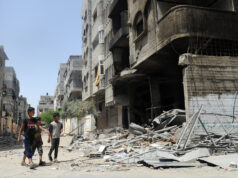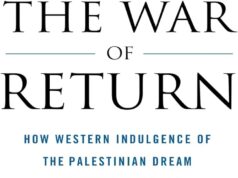The results of Israel’s recent elections, combined with the 22-day offensive against Gaza, have led many to wonder about the future of peace talks with the Palestinian Authority.
But the jockeying for power in Israel between the centrist Kadima party and the right-wing Likud overshadows another significant obstacle standing in the way of any future peace deal between Israelis and Palestinians: namely, determining who, between the more secular Fatah leaders in the West Bank and the Islamist Hamas leaders in the Gaza Strip, represents the Palestinian people.
“No matter the outcome [of negotiations to form an Israeli government], the fact remains whether you are right, left or center, you are not going to be able to get back on track the peace process while there is a Palestinian civil war,” Jonathan Schanzer, author of “Hamas vs. Fatah: The Struggle for Palestine” told World Politics Review.
Hamas won the Palestinian Authority’s general legislative election in 2006, to the great shock of the United States. After a failed attempt at a unity government with Fatah in 2007, Hamas took control of the Gaza Strip in a series of bloody street battles with Fatah security forces. In response, Fatah enacted emergency rule over the West Bank and swore in a new government, while the United States, Israel and Europe imposed crippling economic sanctions on the Gaza Strip.
The recent 22-day Israeli offensive against Gaza again exposed the rift in the Palestinian camp. Despite the Gaza death toll, Fatah forces in the West Bank largely ignored Hamas’ call for a third intifada. Abbas also initially blamed Hamas for the violence, costing him dearly in Palestinian public opinion. In the aftermath of the conflict, Hamas has allegedly conducted targeted assassinations of Gaza-based Fatah agents it claims collaborated with Israeli forces.
The war has also raised tensions within Hamas, between leaders inside Gaza and those in Damascus, over accepting a ceasefire and, in a broader sense, over how to deal with Israel. Some in Gaza blame exiled Hamas leader, Khaled Meshal, for triggering the conflict by not renewing the previous truce in December.
“If division and [in-fighting] continue among the Palestinians, the chances for peace settlement are going to be limited,” Mohammad Yaghi of the Washington Institute on Near East Policy told WPR.
Reconciliation talks between the two factions, sponsored by Egypt, are part of the multistep negotiations designed to shore up the fragile Gaza ceasefire. While the two sides agree in principle to the idea of a national unity government for the Palestinian Authority, they are separated by thorny issues, including who shall administer reconstruction efforts in Gaza, under whose authority border crossings will be placed once they are opened, and the overdue PA presidential election (which Hamas claims delegitimizes the rule of Western-backed Palestinian President Mahmud Abbas), not to mention their fundamental disagreement over the use of force against Israel.
The negotiations, originally scheduled for Feb. 22, hinged on finalizing a long-term ceasefire between Israel and Hamas. Progress toward finalizing that ceasefire stalled Wednesday after the Israeli government said it would not lift its border blockade on the Gaza Strip — one of Hamas’ conditions — until Hamas agrees to the release of captured Israeli soldier Gilad Shalit. Hamas rejected that demand, saying there is no connection between the two issues and that they must be negotiated separately.
As a result, Eygpt was forced to postpone the talks that many hoped would help broker Palestinian national unity.
Schanzer suggests that even if Israel vacated settlements in the West Bank, opened up all transit points in the West Bank, and allowed a number of refugees into their country, there is a good chance the uncertainty over who rules the Palestinians would create an awkward political situation that could derail any deal.
“If you are Barack Obama . . . and you deal with Fatah, you are dealing with an unelected government that is moderate, but really only represents half of the Palestinians,” he said, pointing out that there are 1.5 million Palestinians in Gaza. If you pick Hamas, you deal with a terrorist organization, “something that would fly in the face of U.S. policy dating back to the Nixon administration.”
Asked what the solution is, Schanzer said the Arab League or the Organization of the Islamic Conference might need to “forcibly bring [the two sides] together so the Palestinians could eventually speak with one voice if a peace deal is offered.”
Yaghi, meanwhile, suggests the U.S. must determine Abbas’s political strength. “It has to answer the question how it is possible to make a settlement with half the Palestinians only, and certainly the current situation is ideal for those in Israel who don’t believe in peaceful settlement.”
“I am not sure they can reach an agreement because the division is about core issues such as the task of the security forces, the negotiation with Israel, the armed ‘resistance’, the PLO,” he said. “But maybe with the help of Arab countries, they can put aside some of these differences for some time, and agree to give Abbas some time to negotiate a settlement with Israel, and then put this . . . agreement that Abbas may reach to a referendum.”
He said public pressure from Palestinians and Arab countries in favor of national unity could yield such a deal. “But as I said, the division is deep and it’s hard to assume the Palestinian parties have the will or want to reach a kind of unity,” he said.
Seth McLaughlin is a Washington-based journalist.





